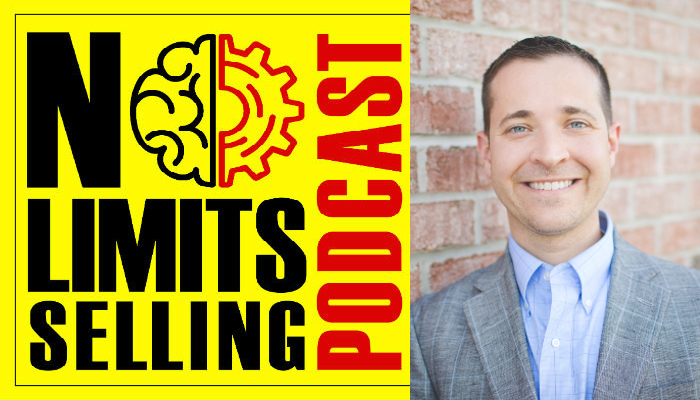Chris Perry, Vice President of Strategic Growth at Berkshire Hathaway HomeServices PenFed Realty
On Episode 86 of The No Limits Selling Podcast, we have Chris Perry, Vice President of Strategic Growth at Berkshire Hathaway HomeServices PenFed Realty. Chris is focused on helping develop people and their businesses; while also finding more passive income streams to build a bigger legacy to pass on to his family.
Raised in a Christian family, Chris believes the "secret" to success and living a fulfilled life is being kind and helping others. He went to DeMatha High School and rowed on the crew team for 2 years, then went to the University of MD and graduated in 2006 with a degree in Marketing. While in College, Chris worked with Southwest Airlines as a Marketing Intern focusing on Southwest for business travel.
After college, Chris became a sales account manager for Pepsi Bottling Group - managing a team of 4 and selling to 13 large stores in a high-end area of Maryland.
Through a college friend, Chris was connected to a new home builder (NVR) and joined them in 2007 as a Sales And Marketing Rep. He recalls people thinking he was crazy getting into a 100% commission job in real estate, during the worst market most of us have ever been through - And he would never change a thing!
He worked at NVR until 2014, and for the last 3 years he was there, Chris helped salespeople learn how to sell the market and manage their communities.
In February 2014, He was hired as Team Leader for the Bel Air, MD Keller Williams Office. And in June of 2019, Chris was hired as Area Vice President of Berkshire Hathaway HomeServices PenFed Realty.
Chris' main focus for the last 5 years has been to recruit talent for his company and for teams, and to coach other agents to higher levels of production and quality of life.
Chris enjoys playing cards and basketball with friends (he also coaches his son's team). He Loves playing with his kids, trips to the beach with family and friends, and spending quality time with those who are close to him.
Chris grew up in Maryland right outside of our nation's capital. He resides in Harford County with his wife Rebecca and 2 children: Braeden and Brynn.

Contact Chris:
[EDITOR’S NOTE: This podcast is sponsored by No Limits Selling. It is a fun, fast-paced podcast that delivers hard-fought business advice that you can implement today to improve your sales and performance]
Interested In Our Real Estate Coaching Services? Explore Our Website: Link
Feeling Not Well Today? You Can Use Our Mindset Boosters App To amp Up Your Mood: Link
Find us on Social Media:
LinkedIn | Facebook community | Instagram
Like what do you listen to? Subscribe to our podcast!
Ready to become fearless? We can help you become fearless in 60 days so you accomplish more in your career Schedule A 15 min Call with UmarSummary
Introduction
The podcast features Chris Perry, the Vice President of Strategic Growth at Berkshire Hathaway HomeServices PenFed Realty. The host, Umar Hameed, introduces Chris and sets the stage for a conversation about leadership, what works, and what doesn't work in leading a team. The interview was conducted in a park, under a tree, which added a unique touch to the conversation.
Leadership and Team Building
The conversation delves into the challenges of transitioning from a sales role to a team leader role. Chris shares examples of individuals who made the transition successfully and those who struggled. He emphasizes the importance of focusing on leadership skills, growing people, and team dynamics. He also highlights the challenges of letting go of control, which he identifies as a common issue for those struggling with building a team in real estate.
The Human Element in Leadership
The podcast explores the human element in leadership. Chris and Umar discuss why leadership challenges have remained the same over the years, despite advancements in other areas. They agree that being genuine is crucial in leadership, as faking it can only last for a certain amount of time. They also discuss the importance of aligning with the values of the team and the individuals you are leading.
Recruiting Perspective
From a recruiting perspective, Chris talks about the importance of attracting the right individuals who align with the company's values. He emphasizes that even if individuals are talented, if they do not align with the company's values, there will be challenges and obstacles that may not be overcome in the long term.
Conclusion
In conclusion, the podcast with Chris Perry, Vice President of Strategic Growth at Berkshire Hathaway HomeServices PenFed Realty, provides insightful perspectives on leadership and team building. Perry emphasizes the importance of genuine leadership, the necessity of aligning with team values, and the challenges of transitioning from a sales role to a team leader role. He also discusses the human element in leadership and the need for authenticity in recruiting practices.
Despite the constant evolution of the business landscape, Perry and host Umar Hameed highlight that the core challenges of leadership remain the same, underscoring the timeless nature of effective leadership principles.
Questions & Answers
What are the key leadership insights from Chris Perry's podcast?
How does Chris Perry view the transition from a sales role to a leadership role?
What is the 'human element' in leadership according to Chris Perry?
How does Chris Perry approach recruiting in his leadership role?
What are the key takeaways from Chris Perry's podcast?
Don’t miss this opportunity to transform your real estate career with one-on-one coaching. As an experienced real estate coach, I, Umar Hameed, am dedicated to helping you unlock your full potential and achieve your real estate goals. To learn more about who am I and my clients ↓
If you’re ready to take the next step, book an appointment with me today and begin your journey toward success in the real estate industry.
